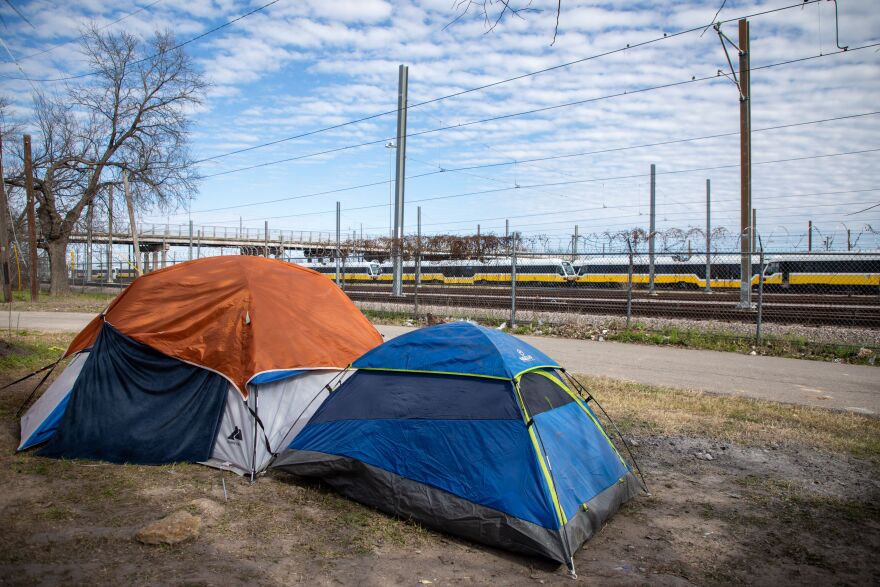Dallas and Collin counties have seen homelessness decline for a third year in a row, according to the latest data from an annual survey of unhoused people.
This year’s annual count found 3,718 people experiencing homelessness in Dallas and Collin counties on a single night in January, which Housing Forward noted is a reduction in overall homelessness of 19% since 2021. Last year, there were 4,244 people counted as unhoused in the two counties, meaning the two counties saw a 12% overall decline.
The reduction comes even as homelessness nationwide has been on the rise in recent years. It’s a clear sign the strategies employed in the homeless response system are working, said Housing Forward CEO Sarah Kahn.
“We’re doing some incredible work together and it’s showing incredible results. But I don’t think there’s anyone in this room who would say our work is finished,” Kahn said.
Housing Forward released the data at a morning breakfast event at the Winspear Opera House attended by elected officials and staffers from the many organizations that work with people experiencing homelessness.
Not far from the upscale location, Kahn noted, people are living on the street.
“In the shadows of one of the best arts districts in America, there are people who are literally living in tents, storing their belongings in shopping carts and keeping warm around a fire pit. That is in America, one of the richest nations in the world,” Kahn said.
More than 95% of those we engage at encampments say yes to housing, despite common myths that our unhoused neighbors are service-resistant.Rae Clay, Housing Forward Chief Program Officer
Housing first
Kahn said unsheltered homelessness by 24% since 2021, when a $72 million initiative was launched to move people from the streets and into long-term housing with supportive services. Just a few weeks earlier, Kahn said, an encampment just blocks from the opera house was closed after its residents were helped to move into apartments of their own.
This encampment decommissioning strategy relies on teams of outreach workers who spend months working with people living in encampments to figure out what each individual needs, connect them to services and assistance programs, and find them an apartment where a casework helps them stay housed.
“More than 95% of those we engage at encampments say yes to housing, despite common myths that our unhoused neighbors are service-resistant,” said Rae Clay, Housing Forward’s chief program officer.
Dallas is also increased federal funding to expand efforts to help people who are newly homeless to find somewhere to stay. It’s a problem-solving approach that could mean helping people move in with friends or family, Clay said, and it frees up shelter space and prevents people from experiencing debilitating traumas that come with long-term homelessness.
The majority of people experiencing homelessness in Dallas and Collin Counties are Black, according to the data. That’s despite Black households making up just 19% of households, a disparity produced by historic and ongoing policies and practices that, intentionally or not, harm Black communities. Clay said there’s “renewed focus” on addressing racial disparities in the homeless response system.
System transformation
The report also found veteran homelessness dropped 21% since last year’s point-in-time count. Youth homelessness decreased by 22% and family homelessness decreased by 15%.

David Woody, CEO of The Bridge Homeless Recovery Center, said a “system transformation” launched in 2020 is driving the positive results. That transformation has knitted together the homeless response network in the Dallas region so fewer people fall through the cracks. It also helped the two-county system attract significantly more federal funding and support to expand efforts.
“We're making progress, progress that has allowed our continuum of care to better compete for resources necessary to sustain the various housing solutions our community needs,” Woody said, “an outcome which seemed nearly impossible four or five years ago.”
Between 2015 and 2021, homelessness in the two counties increased by 45% from 2015 to 2021. The massive infusion in federal funding during the pandemic and more recently helped fuel the system transformation work and resulted in three years of declining homelessness in Dallas and Collin Counties.
Kahn and other presenters stressed that the strategies being used to reduce homelessness in the region are working even as housing and other costs squeeze more and more households.
“We have to expand our street-to-home encampment response, and we've lined up the resources to do that. But we have to move faster and we've got to go bigger this year,” Kahn said. “We all hear from our friends, our family, other community members that they're not feeling that progress. And the only way we as a community are going to feel that progress is if we continue to go faster around the community and target areas where people are living outside and to support moving them back into apartments.”
Got a tip? Christopher Connelly is KERA's One Crisis Away Reporter, exploring life on the financial edge. Email Christopher at cconnelly@kera.org.You can follow Christopher on Twitter @hithisischris.
KERA News is made possible through the generosity of our members. If you find this reporting valuable, consider making a tax-deductible gift today. Thank you.





